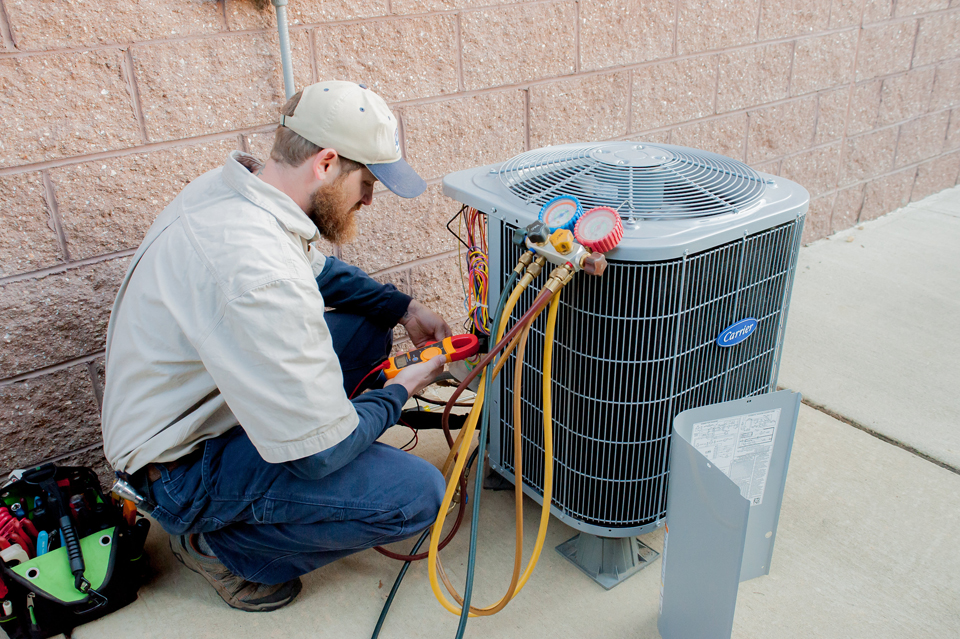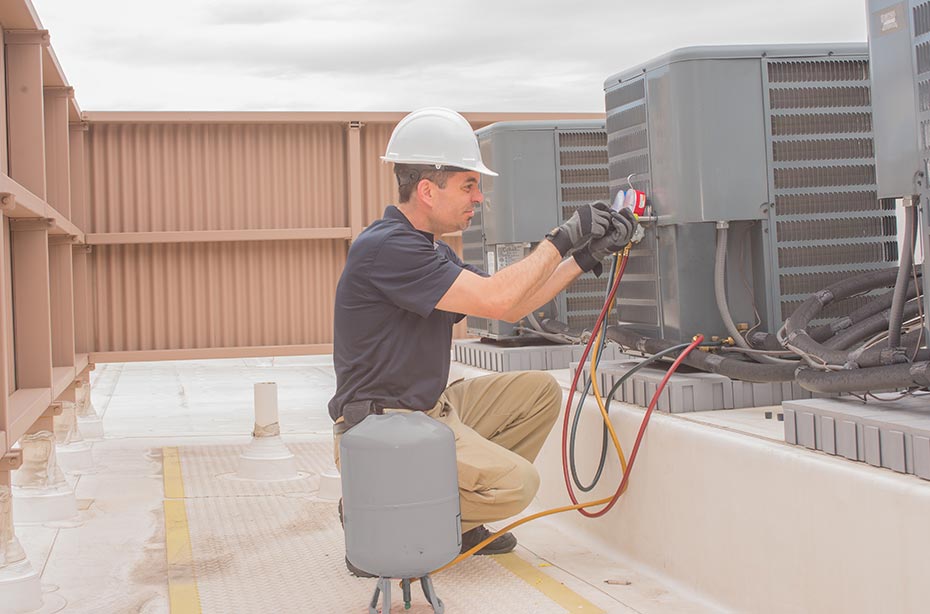Things to Know Before Your heat pump replacement ooltewah tn Starts
Things to Know Before Your heat pump replacement ooltewah tn Starts
Blog Article
Picking In Between a Warm Pump and Heater: Key Factors To Consider for Your Heating And Cooling Demands
When reviewing heating alternatives for cooling and heating needs, the decision between a heatpump and a heater can be intricate. Each system offers unique advantages tailored to certain environments and power performance goals. Understanding these distinctions is vital for making an informed selection. Key factors such as setup costs and environmental impact even more complicate the option procedure. Which option absolutely aligns with one's comfort and sustainability choices? The following areas will check out these considerations in detail.
Recognizing Warm Pumps: Just How They Function and Their Benefits
While several homeowners think about various heating choices, understanding exactly how warm pumps function and their advantages can greatly influence their decision. Heat pumps run by transferring heat instead of producing it. In the winter season, they draw out warm from the outside air or ground and transfer it inside your home, while in the summer, they reverse this process, cooling down the home by eliminating warmth outside. This double functionality makes them flexible for year-round climate control.One of the primary benefits of heatpump is their energy efficiency. They use considerably less electrical power compared to traditional home heating systems, possibly resulting in reduced utility costs (heat pump installation ooltewah tn). Additionally, heat pumps have a smaller carbon impact, making them an ecologically pleasant selection. They additionally need less maintenance than traditional systems, contributing to long-lasting price savings. In general, recognizing the mechanics and benefits of heatpump can aid house owners make informed decisions regarding their home heating and cooling down demands
Discovering Furnaces: Kinds, Operation, and Benefits
Heating systems can be found in various types, including gas, electric, and oil models, each with distinct operational mechanisms. Understanding these differences is necessary, as they influence performance and home heating efficiency. Furthermore, heating systems use countless advantages, such as constant warm outcome and dependability in colder climates.
Sorts of Heaters
Furnace can differ significantly in layout and operation, with heaters being a preferred option among homeowners. There are a number of sorts of furnaces, each using various fuel resources and innovations. Gas heating systems prevail, leveraging gas to create warm successfully. Electric heaters, on the other hand, utilize electric resistance to create warmth, typically favored for their uncomplicated installation. Oil furnaces, while much less typical, work in areas with limited gas access (furnace replacement). Additionally, condensing heaters make best use of power effectiveness by reusing and recording exhaust gases. Each type operates with a system of heat exchangers and ductwork to disperse warm air throughout a home. Recognizing the differences between these heater types is crucial for notified HVAC choices
Benefits of Heaters
For property owners looking for reputable heat during cool months, the advantages of heaters are considerable. Furnaces give consistent heating, making certain even temperature levels throughout the home. They are particularly reliable in extreme cold, often outmatching heatpump in cold conditions. Numerous kinds, consisting of gas, electric, and oil heaters, provide flexibility to satisfy varied demands and preferences.Furnaces additionally tend to have lower initial setup prices contrasted to heatpump, making them a more available choice for lots of. Their durable style contributes to a longer lifespan, with numerous devices lasting over 15 years with proper maintenance. In addition, modern-day heaters are usually geared up with advanced technology for enhanced effectiveness, which can cause minimized power expenses. In general, heating systems stay a reliable selection for effective home heating.

Energy Efficiency: Contrasting Warm Pumps and Furnaces
When contrasting energy efficiency in between warmth pumps and furnaces, the Seasonal Power Effectiveness Ratio (SEER) plays an essential role in figuring out performance. Furthermore, a functional cost analysis exposes the long-lasting economic effects of each system. Comprehending these elements can lead property owners in making educated choices about their home heating solutions.
Seasonal Power Effectiveness Ratio
Power effectiveness plays an essential duty in the decision-making process in between heat pumps and furnaces, specifically when taking into consideration the Seasonal Power Efficiency Proportion (SEER) This metric steps the cooling efficiency of heatpump over a whole cooling period, giving a standard method to evaluate performance. Greater SEER scores indicate better energy efficiency, converting to lower energy usage and decreased energy expenses. On the other hand, furnaces are commonly examined utilizing the Yearly Fuel Application Effectiveness (AFUE) score, which reflects heating efficiency. When comparing these 2 systems, house owners need to prioritize SEER rankings for heatpump, as they straight effect overall energy cost savings and ecological sustainability. A detailed understanding of SEER can notably influence the long-lasting satisfaction and cost-effectiveness of the picked cooling and heating remedy.
Operational Expense Evaluation
Comprehending the functional expenses connected with warmth pumps and furnaces is vital for house owners assessing their options. Heatpump commonly offer higher power efficiency, converting electrical power right into warmth with marginal waste. This causes reduced month-to-month energy expenses, particularly in moderate environments. Alternatively, typical heaters, specifically gas versions, might have reduced in advance costs but can incur greater functional costs in time due to fuel rates and performance ratings.Moreover, heatpump can work as both heating and cooling systems, possibly minimizing the requirement for separate heating and cooling units. While first financial investments for heat pumps might be higher, their long-lasting savings in power effectiveness can make them a more cost-effective choice for several families. Cautious evaluation of regional energy prices special info is necessary to establish the ideal alternative.
Installment Expenses: What to Anticipate for every Furnace
Setup costs for heater can differ considerably between heat pumps and furnaces, affecting property owners' decisions. Heatpump normally have greater ahead of time installation prices, typically ranging from $3,500 to $8,000, depending upon the unit size and complexity of setup. This consists of the exterior device, indoor handling system, and required ductwork alterations. On the other hand, furnaces often tend to have lower site link first expenses, balancing in between $2,500 and $6,000, which can be appealing for budget-conscious homeowners. Installment expenditures can enhance if considerable ductwork is required.Moreover, the option of gas kind for furnaces-- all-natural gas, lp, or electric-- can likewise influence setup prices. While heatpump offer energy effectiveness, their preliminary financial investment may hinder some customers. Inevitably, examining installation expenses along with lasting financial savings and performance will certainly assist house owners in making educated choices regarding their heater.
Climate Factors To Consider: Which System Does Better in Your Area
How do climate conditions affect the effectiveness of heating unit? The performance of heatpump and heating systems can differ significantly relying on the neighborhood climate. In modest environments, warmth pumps excel by successfully transferring warm from the outdoors air, making them an energy-saving option. Nonetheless, their efficiency diminishes in very cool temperatures, where they may have a hard time to extract enough warmth. Alternatively, heating systems, particularly gas versions, offer regular and trustworthy warm despite outdoor problems, making them better in chillier regions.In areas that experience milder winters, heatpump can run properly year-round, supplying both cooling and heating. On the other hand, areas with harsh winters commonly take advantage of the toughness of furnaces. Inevitably, recognizing the neighborhood climate is important when choosing between a heatpump and a heating system, as it straight influences their operational performance and total performance.
Upkeep Demands: Long-Term Care for Warm Pumps vs. Furnaces
While both heatpump and heating systems require regular maintenance to guarantee peak performance, their certain needs and treatment routines differ considerably. Furnaces normally require less constant interest, with annual assessments being sufficient to examine for gas leaks, clean filters, and assess total functionality. Their simpler layout often permits uncomplicated repairs.In contrast, warmth pumps demand biannual upkeep because of their dual function in cooling and heating. This consists of cleansing coils, inspecting cooling agent levels, and making sure that both the outdoor and indoor units operate at their best. In addition, heat pump upkeep usually involves even more complex elements, making professional servicing essential.Neglecting maintenance can bring about lessened efficiency and boosted energy costs for both systems. Inevitably, house owners must think about these lasting treatment requirements when choosing in between a heatpump and a heating system, as aggressive maintenance can prolong the look at here life expectancy and performance of either system considerably.
Ecological Effect: Selecting a Sustainable Home Heating Alternative
The environmental impact of furnace is a crucial evaluation for home owners looking for sustainable options. Warmth pumps are typically a lot more energy-efficient than conventional heaters, as they transfer warmth instead of create it, considerably decreasing carbon discharges. By utilizing renewable resource sources, such as air-source or geothermal heatpump, property owners can further minimize their environmental footprint.On the other hand, all-natural gas furnaces produce greenhouse gases and add to air contamination, though they commonly supply greater warm output. However, improvements in innovation have led to the development of high-efficiency heating systems that lessen emissions.Ultimately, choosing a heating unit entails considering effectiveness versus ecological effect. Home owners are urged to review neighborhood energy resources and motivations for renewable systems, making sure a choice that straightens with both personal convenience and ecological obligation. The choice impacts not only immediate convenience however additionally long-term sustainability and environmental wellness.
Often Asked Inquiries
How Long Do Heat Pumps and Furnaces Generally Last?
The lifespan of warmth pumps typically ranges from 15 to two decades, while heaters can last between 15 to three decades. Normal upkeep significantly influences their durability and efficiency in supplying heating options.
Can I Use a Warmth Pump in Exceptionally Cold Climates?
Heat pumps can run in incredibly cold environments, yet their efficiency lessens as temperature levels drop. In such conditions, supplemental heating sources might be essential to maintain comfortable indoor temperatures and ensure peak performance.

What Is the Noise Degree of Warmth Pumps Versus Furnaces?
The noise levels of heatpump and furnaces vary considerably. Typically, heatpump operate even more silently than conventional heaters, making them more suitable for those conscious appear, while heating systems may create louder operational sounds during home heating cycles.
Are Warmth Pumps Suitable for Both Heating & Cooling?
Heatpump are certainly suitable for both heating & cooling (furnace replacement). They work by moving heat, supplying efficient temperature level control year-round, making them a flexible choice for property owners seeking an all-in-one heating and cooling service
What Dimension Furnace Do I Required for My Home?
Identifying the appropriate size furnace for a home requires reviewing elements such as square video, insulation top quality, neighborhood environment, and the home's design. Consulting an expert can guarantee an accurate assessment and optimal convenience. Warm pumps usually offer higher energy effectiveness, converting electric power right into heat with very little waste. In modest environments, warm pumps stand out by efficiently moving warm from the outside air, making them an energy-saving option. On the other hand, furnaces, especially gas versions, offer trusted and regular heat regardless of outside problems, making them more suitable in cooler regions.In areas that experience milder winters months, heat pumps can operate successfully year-round, giving both heating and cooling. Warm pumps are usually a lot more energy-efficient than conventional furnaces, as they move heat rather than produce it, significantly minimizing carbon discharges. By using renewable energy sources, such as air-source or geothermal warm pumps, homeowners can further reduce their eco-friendly footprint.On the various other hand, all-natural gas furnaces emit greenhouse gases and contribute to air pollution, though they often offer higher warm outcome.
Report this page